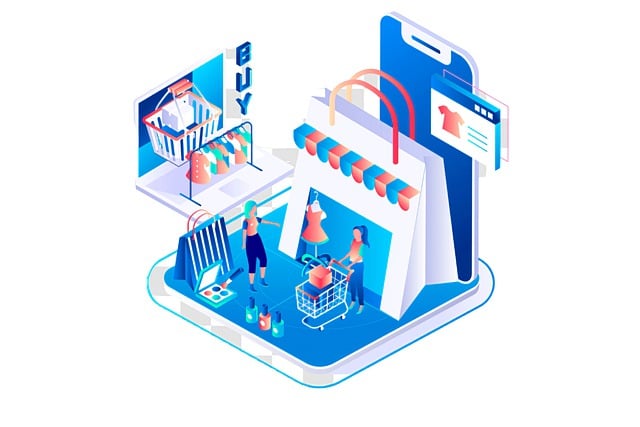E-commerce AI chatbots are transforming online shopping by offering 24/7 personalized assistance using NLP and machine learning. They handle queries, provide product recommendations, automate tasks, and drive sales through data-driven insights. Integrating these chatbots on e-commerce platforms enhances user experience, improves conversion rates, and optimizes digital presence. Effective training, customization, and continuous improvement strategies ensure successful performance, with KPIs measuring user satisfaction and conversation completion rates. A/B testing further refines chatbot capabilities in a competitive marketplace.
In today’s digital era, e-commerce AI chatbots are transforming customer interactions, offering instant support and personalized experiences. This comprehensive overview explores the full spectrum of these virtual assistants, from understanding their core functionality to uncovering the immense benefits they bring to online retail. We dissect the key components that enable effective conversations and delve into proven training methods for optimal performance. Additionally, we provide strategies for measuring success and fostering continuous improvement.
- Understanding E-commerce AI Chatbots: A Comprehensive Overview
- Key Components and Functionality of a Scripted Chatbot
- Benefits of Implementing an AI Chatbot in E-commerce
- Training and Customization Techniques for Effective Conversations
- Measuring Success and Continuous Improvement Strategies
Understanding E-commerce AI Chatbots: A Comprehensive Overview

E-commerce AI chatbots are transforming the way businesses interact with their customers, providing instant and personalized assistance 24/7. These advanced conversational agents leverage natural language processing (NLP) and machine learning algorithms to understand customer queries and deliver accurate responses. By integrating an ecommerce AI chatbot on your website or messaging platform, you can enhance user experience, increase sales conversions, and build stronger customer relationships.
These chatbots offer a range of functionalities, from answering product-related questions and providing recommendations to facilitating purchases and handling returns. They can learn from customer interactions, adapt their responses over time, and even gather valuable insights to improve product offerings and marketing strategies. With the ability to scale effortlessly, ecommerce AI chatbots are a cost-effective solution for businesses looking to optimize their digital presence and stay competitive in the dynamic online marketplace.
Key Components and Functionality of a Scripted Chatbot

A scripted AI chatbot, particularly in the context of e-commerce, is a sophisticated tool designed to enhance customer interactions and drive sales. Its key components include natural language processing (NLP) capabilities that enable it to understand user queries and context, and machine learning algorithms that facilitate continuous learning from user conversations. These features allow the chatbot to provide personalized responses, offer product recommendations, and guide users through the purchasing process.
The functionality of such a chatbot involves handling customer inquiries efficiently, offering 24/7 support, and collecting valuable customer data for analysis. By scripting conversational flows, businesses can ensure consistent and accurate information delivery. Moreover, integration with e-commerce platforms allows seamless product browsing, cart management, and checkout assistance, ultimately improving user experience and conversion rates.
Benefits of Implementing an AI Chatbot in E-commerce

Implementing an AI chatbot in e-commerce offers significant advantages, transforming the way businesses interact with their customers and enhancing overall user experience. These intelligent virtual assistants provide 24/7 availability, ensuring customers can receive instant support at any time, boosting customer satisfaction and loyalty. By handling frequent queries and providing quick responses, AI chatbots free up human agents to focus on more complex issues, increasing operational efficiency.
Moreover, e-commerce ai chatbots can offer personalized product recommendations based on user interactions and purchase history, encouraging sales and fostering a sense of individualized attention. They can also collect valuable customer feedback, helping businesses make data-driven decisions and continually improve their offerings. This integration revolutionizes the shopping experience, making it more convenient and engaging for customers while driving business growth.
Training and Customization Techniques for Effective Conversations

Training and customization are key aspects in developing an effective eCommerce AI chatbot. To ensure meaningful conversations, the chatbot should be trained on a diverse dataset relevant to the retail domain. This includes understanding product descriptions, customer queries, and industry-specific terminology. Advanced machine learning techniques like natural language processing (NLP) enable the chatbot to interpret user inputs accurately and generate contextually relevant responses.
Customizing the chatbot’s behavior further enhances its performance. Developers can fine-tune the model by incorporating brand-specific lingo, product attributes, and customer service guidelines. This customization ensures that the chatbot aligns seamlessly with the brand’s voice and offers personalized assistance to shoppers. As a result, users experience more satisfying interactions, fostering higher customer engagement and satisfaction in the online shopping journey.
Measuring Success and Continuous Improvement Strategies

Measuring success and implementing continuous improvement strategies are vital aspects of an e-commerce AI chatbot’s lifecycle. Success can be gauged through various metrics, including user satisfaction scores, conversation completion rates, and the percentage of users who convert after engaging with the chatbot. By analyzing these key performance indicators (KPIs), businesses can identify areas where their chatbot excels and falls short.
For continuous improvement, it’s essential to adopt a data-driven approach. Regularly reviewing chatbot transcripts, user feedback, and behavior patterns can reveal valuable insights. Using this information, developers can refine conversation flows, enhance knowledge bases, and personalize interactions. Additionally, integrating A/B testing allows for experimental strategies to optimize performance, ensuring the e-commerce AI chatbot remains effective and competitive in a dynamic market.
E-commerce AI chatbots are no longer a futuristic concept but a reality that offers immense potential for enhancing customer experiences. By understanding the key components, benefits, and strategies for implementation and improvement, businesses can harness the power of these scripted assistants to drive sales, improve customer satisfaction, and gain valuable insights into consumer behavior. An effective ecommerce ai chatbot is not just a tool but a dynamic element in the ever-evolving digital landscape, transforming how brands interact with their customers and revolutionizing the way we shop online.
